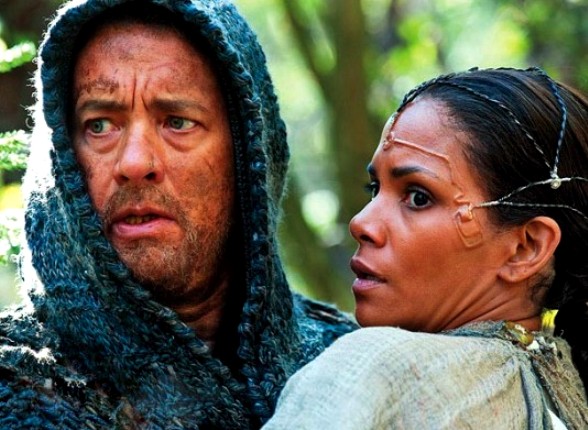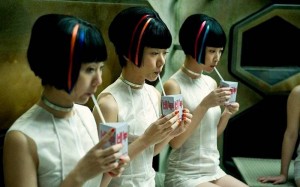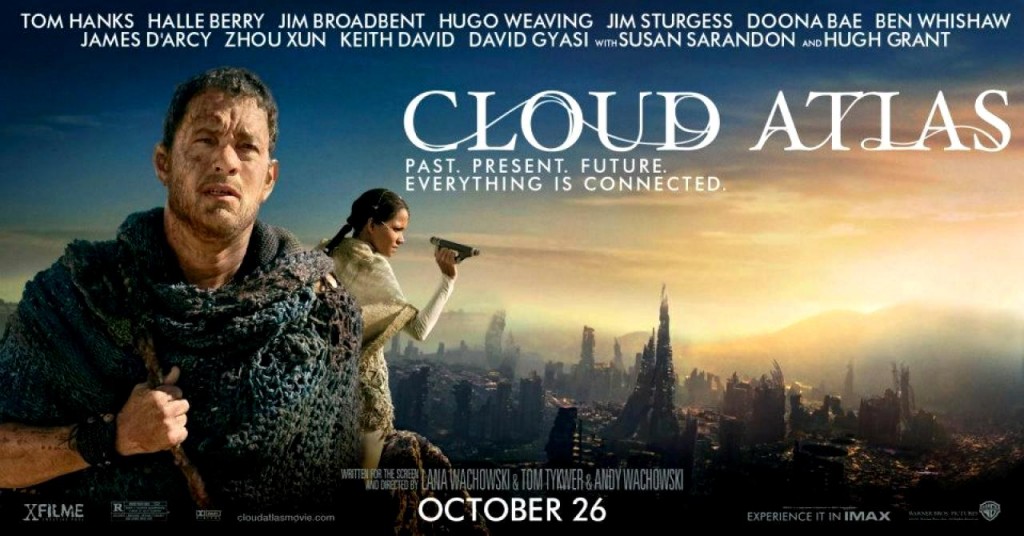
Philosophical tapestries that take awhile to connect, and eventually arrive to some meaning. Cloud Atlas has meaning that comes to one’s individual interpretation, considering six stories in different eras played by actors who are reincarnated from one identity to the next – their souls evolve, or devolve, supposedly. Tom Hanks is playing either a Man of Virtue or Man of Greed; Halle Berry is playing a soul who is forever striving for truth and liberation; Hugo Weaving is always a sadistic baron, hitman or specter (huh?). This daring three-hour epic almost falls into the realms of cinematic folly before it gets going – it’s clunky and rambling. Amazingly it gets better, more intriguing, more connected between lifetimes past, present, future. That’s the truth, you’d have to be willing to invest (it stops sucking once it gets into some orderly episode interlinking).
At the end, this is a gnarly, pessimistic work of art. Andy and Lana Wachowski (“The Matrix”) and Tom Tykwer (“Run Lola Run”) collaborate the epic directing duties, and the more vulgar or destruction-laden it becomes, the more shamelessly compelling it gets. Reincarnation, as said, is a criterion subject of the film with the characters making the same mistakes life after life. Ask this: Have you ever wondered if different versions of yourself, in different time periods, become susceptible to the same obstacles, and punishments time after time? The theme of slavery in different forms is ubiquitous.
 The strangest storyline is Neo Seoul in the year 2144, suggesting a future where human clones are disturbingly processed as slaves to serve a menial function. Korean actress Doona Bae is a fabricant with a collar around her neck, different from the purebloods, who lives to serve others. She is unshackled by a version of Jim Sturgess (who plays several roles, too, including a lawyer in 19th century America who frees a slave). This is not a world any of us want to live in, and eventually we see the cloning factory that is reminiscent of “Soylent Green” and “The Matrix.” What doesn’t work is seeing Sturgess as an amped-up Neo-esque/Star Wars rebel warrior. Loses serious validity.
The strangest storyline is Neo Seoul in the year 2144, suggesting a future where human clones are disturbingly processed as slaves to serve a menial function. Korean actress Doona Bae is a fabricant with a collar around her neck, different from the purebloods, who lives to serve others. She is unshackled by a version of Jim Sturgess (who plays several roles, too, including a lawyer in 19th century America who frees a slave). This is not a world any of us want to live in, and eventually we see the cloning factory that is reminiscent of “Soylent Green” and “The Matrix.” What doesn’t work is seeing Sturgess as an amped-up Neo-esque/Star Wars rebel warrior. Loses serious validity.
Other important actors leave eerie impressions. Jim Broadbent who is a recurring artist in each life; Hugh Grant as a tyrant or tycoon; Ben Whishaw as a gay outcast; Susan Sarandon as a matron or sage. Sometimes the actors are not as important as the backdrops of the stories. The ultimate futuristic scenes, featuring Hanks and Berry as post-apocalyptic searchers of another planet exodus, is strange in all the wrong ways – it gets obscure.
“Cloud Atlas,” based on a 2004 novel by David Mitchell, must be a lurid mind-boggling read. I would guess the novel, like the movie, has strong philosophical points as well as foggy ones. By the end of the movie, I felt like I was in the movie theater for three years. I was fazed but wasn’t that bored, and I found some of my time spent with it to be valuable. This is a rare case where I can’t tell you to go or not to go (you will probably spend the next three years internet surfing other peoples’ opinions). The value of the film will be radically different from person to person. But I do know this: It’s way better than “Slaughterhouse Five.”
172 Minutes. Rated R.
SCI-FI & FANTASY / THINKING MAN’S THRILLER / WEEKEND FOOD FOR THOUGHT
Film Cousins: “Slaughterhouse Five” (1972); “Soylent Green” (1973); “Dune” (1984); “Synecdoche, New York” (2008).





